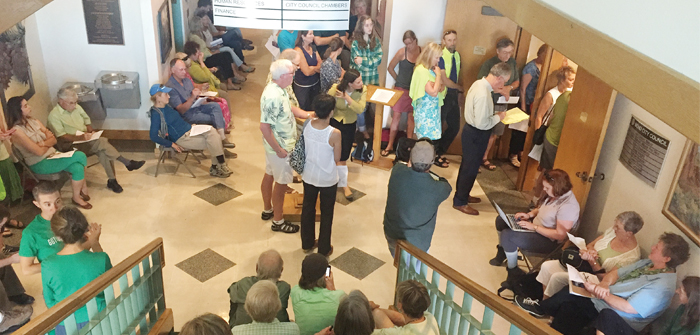Special Bend City Council Meeting on Climate Action
With a controversial issue on the docket like climate change, City of Bend Mayor Jim Clinton started the special session on July 21 directing the audience, “This is not a political convention or parliament. We don’t allow hissing clapping or cheering. If you have a reaction, keep it at a sub-audible level. Keep it at a nice civil tone.”
After a summary of direction to-date including discussion of accountability for creating a Climate Action Plan, establishing an ad hoc Climate Action Steering Committee (CASA), setting aspiration goals and proposing a mandatory process with timelines, an Emissions Inventory was presented by Matt Shinderman, PhD, Natural Resources and Sustainability senior instructor from OSU-Cascades.
Among Dr. Shinderman’s preliminary findings was reason to believe Bend is “tracking really similarly to other cities” in terms of greenhouse gas (GHG) production and the split of emission sources. “This means our analysis is on track,” explained Dr. Shinderman, however, he called for greater incorporation of the city’s infrastructure footprint. An example of this would be refining the study to the extent of collecting fuel receipts from contract workers such as road paving and maintenance crews as well as accounting for materials used. Cities compared were Bellingham, Fort Collins and Eugene.
Organizational feed back was then invited. Groups that spoke included Bend Chamber, Bend Economic Development Advisory Board (BEDAB), Citizens’ Climate Lobby, Trout Unlimited and the Oregon League of Conservation Voters (OLCV). Jeffery Richardson, a member of the original Climate Ordinance Working Group spoke as well.
Organizations in favor of the ordinance expressed concern to match widely accepted international goals of cutting GHG by 40 percent by 2030 and at least 70 percent by 2050. Other desires where to see city and business accountability through timetables and a commitment to develop an ordinance as opposed to a resolution. Nikki Roamer of the OLCV said that “177 countries across the globe have committed to the percentage reductions proposed and 400 local citizens have signed a petition in support.”
Arguments in support of a climate action resolution rather than an ordinance submitted that business had not played a significant roll in the initial foundation of formulating Climate Action Policy goals and called for vetting out a further course which would not be rushed and would include extensive studies to establish a current city baseline of emissions.
Eric Schultz, vice-chair of BEDAB, shared that because it was aspirational rather than punitive, the City should be perusing a resolution, not an ordinance. Schultz expanded saying the steering committee should be representative and reduction proposals should be identified after the emissions inventory was complete. He cautioned that making business difficult to conduct would lead to regional employment shifts.
Roamer addressed fear of business and employment decline resulting from a Climate Action Ordinance saying, “Communities with action plans are thriving. This includes Eugene, Boulder, Fort Collins and Corvallis. In 2015, these cities saw job growth and are ranked amongst the best places to live on livibility.com.” She believes committing to a Climate Action Ordinance will be a job creator.
Economic Development of Central Oregon (EDCO) Executive Director Roger Lee feels committing to percentages before GHG baselines are established is putting “the cart before the horse” especially when the City has other critical needs to address. Language used by ordinance supporting organizations such as “accountability, teeth and enforcement,” makes him wonder what a Climate Action Ordinance will mean to businesses.
The special session, which was set to commence before 7pm continued past 9pm and hosted 43 individuals for public comment. For lack of seating, many of these speakers waited in the foyer outside the meeting room beginning as early as 4:30pm.
A high school student who addressed the counsel during the organizational feedback time slot mentioned she had made a Facebook event for the special session and at least ten of her friends showed up to support her and speak during public comment.
Debate over Climate Action Policy will continue at the next City Counsel meeting on August 3 at 5pm.





